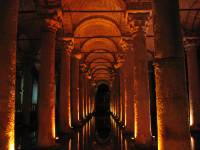The Cistern and Beyoğlu
 The Cistern. After forcing myself to sleep in this morning (referring to the 17th), I headed out so see whatever I could without overlapping attractions from the upcoming tours. First on the list, the Yerebatan Sarnici, aka the Cistern, a hugh underground water storage facility dating back to Justinian. Descend down the steps into the 6th Century cistern, where more than 300 columns brood in perpetual twilight. The floor is covered in what appeared to be about a foot of water, and small fish darted about amongst gleaming coins thrown there by well-wishers. (Get it? Well-wishers? Nevermind!) The cold, moist air seeps into your skin, and the classical music piped in does little to improve the mood of the place.
The Cistern. After forcing myself to sleep in this morning (referring to the 17th), I headed out so see whatever I could without overlapping attractions from the upcoming tours. First on the list, the Yerebatan Sarnici, aka the Cistern, a hugh underground water storage facility dating back to Justinian. Descend down the steps into the 6th Century cistern, where more than 300 columns brood in perpetual twilight. The floor is covered in what appeared to be about a foot of water, and small fish darted about amongst gleaming coins thrown there by well-wishers. (Get it? Well-wishers? Nevermind!) The cold, moist air seeps into your skin, and the classical music piped in does little to improve the mood of the place.  Over the water extends a long ramp that brings you around the cistern to the back, where in one corner stand two peculiar pillars. They stand atop large stone-carved Medusa heads. Medusa, apparently, was believed to ward off evil spirits (something which today is accomplished by the "evil eye," a series of three concentric circles of yellow over white over blue. It's ubiquitous and not a little annoying.) The statues of Medusa are at odd angles -- one is rotated 90 degrees and the other is upside-down. No one knows why for sure but one guess is that it represents the angles at which Perseus saw her reflection in his shield as he slew her.
Over the water extends a long ramp that brings you around the cistern to the back, where in one corner stand two peculiar pillars. They stand atop large stone-carved Medusa heads. Medusa, apparently, was believed to ward off evil spirits (something which today is accomplished by the "evil eye," a series of three concentric circles of yellow over white over blue. It's ubiquitous and not a little annoying.) The statues of Medusa are at odd angles -- one is rotated 90 degrees and the other is upside-down. No one knows why for sure but one guess is that it represents the angles at which Perseus saw her reflection in his shield as he slew her.
After the cistern I paid a short visit to the area where the Hippodrome once stood. Talk about lame. More on that later.
From there I took a taxi to Taksim Square in Beyoğlu and walked along Istiklal Caddesi, the main shopping street for Turks. In the CD music shop I picked up some CDs (I'll edit this later and tell you more). I looked at the clothes as well -- they are about 30% cheaper than in the US but not really styles I would wear at home.
 As the afternoon turned cold, I headed back to the hotel for a nap, then had dinner at a local restaurant. Walking back to the hotel I met a Kurd named Ahmed who works a 24-hour cafe. The cafe is right at the end of a street leading to the Blue Mosque. It's spectacular at night and he was able to translate the big sign out front for me: Insan fanı vakif ebedi, which roughly means "People may die, but piety is eternal." Nice guy who wanted to practice his English. And tomorrow, the tours!
As the afternoon turned cold, I headed back to the hotel for a nap, then had dinner at a local restaurant. Walking back to the hotel I met a Kurd named Ahmed who works a 24-hour cafe. The cafe is right at the end of a street leading to the Blue Mosque. It's spectacular at night and he was able to translate the big sign out front for me: Insan fanı vakif ebedi, which roughly means "People may die, but piety is eternal." Nice guy who wanted to practice his English. And tomorrow, the tours!

0 Comments:
Post a Comment
<< Home